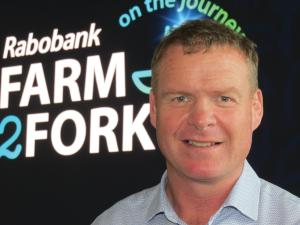Farmers investing in sustainability - Westpac
New Zealand farmers are committed to making their businesses more resilient to climate change and are embracing innovation to help them do so.
 Rabobank NZ chief executive Todd Charteris says a holistic approach is needed to balance NZ’s competing environmental, economic and social priorities.
Rabobank NZ chief executive Todd Charteris says a holistic approach is needed to balance NZ’s competing environmental, economic and social priorities.
A new white paper by agricultural banking specialist Rabobank says a holistic approach targeting improved emissions efficiency and supporting increased food production is key to balancing New Zealand's competing environmental, economic and social priorities.
Launched earlier this month by Rabobank NZ chief executive Todd Charteris at the Primary Industries New Zealand Summit in Wellington, the paper says New Zealand has an important ongoing role to play in combating climate change.
"All around the world damage to infrastructure and disrupted ecosystems impact the livelihoods and well-being of the global population," Charteris explained. "A marginal undersupply of food can result in significant price increases and an upset in this system's balance, often affecting the poorest of the world's population first and the most."
He adds the Paris Accord states emissions reduction efforts should be made in a manner that does not threaten food production; sustainability policies cannot be pursued at the expense of society and the economy.
While NZ farmers feed seven international people for every one Kiwi, Charteris says NZ policy seems "single-mindedly focused on measuring success by the reduction of absolute levels of emissions". He believes this overlooks not only New Zealand's ability to help sustain the world, while we all pursue strategies to mitigate climate change, but also the country's "unique ability and potential for innovation to pursue excellence in emission efficiency per output unit".
Charteris adds that unintended consequences of the Emissions Trading Scheme are already being felt by the communities that feed and clothe New Zealand and the world, such as loss of rural jobs, communities and impacts on rural business confidence and mental health.
"We're seeing production being driven offshore to higher-emitting farming systems resulting in downward pressure on our economy and society.
"We are currently pulling in different directions and punching at whatever policy sounds the best - there is no harmony," he explained.
"A better approach would be considering policy more holistically, finding a natural harmony in our decisions across industry and the government, nationally or globally."
With food security and production as global challenges, Charteris says future emissions policy must look beyond borders. He adds New Zealand's "unique ability and potential" for innovation in emissions efficiency has already seen Kiwi farmers step up to the challenge.
"Globally, we'll need to supply 50% more food to meet population growth demands. To meet the increased production needs will require 4-5 times higher carbon efficiency."
The report identifies 10 key building blocks that will help achieve emissions reductions alongside food security and economic prosperity.
Some of these building blocks are: support for farmers from public and private partners, pathways for supporting emissions efficiency transitions and trust from consumers.
"They won't see any difference in the appearance of their products and so will need to trust the emission reduction practices. Clear communication will be key," said Charteris.
In addition, he says change must be incentives are the most effective way of encouraging a large-scale transition. Fostering an environment that appreciates research, development and innovation will allow them to take advantage of inevitable changes."
South Waikato farm manager Ben Purua’s amazing transformation from gang life to milking cows was rewarded with the Ahuwhenua Young Maori Farmer award last night.
Bankers have been making record profits in the last few years, but those aren’t the only records they’ve been breaking, says Federated Farmers vice president Richard McIntyre.
The 2023-24 season has been a roller coaster ride for Waikato dairy farmers, according to Federated Farmers dairy section chair, Mathew Zonderop.
Ministry for Primary Industries (MPI) director general Ray Smith says job cuts announced this morning will not impact the way the Ministry is organised or merge business units.
Scales Corporation is acquiring a number of orchard assets from Bostock Group.
Family and solidarity shone through at the 75 years of Ferdon sale in Otorohanga last month.

OPINION: This old mutt well remembers the wailing, whining and gnashing of teeth by former West Coast MP and Labour…
OPINION: Your canine crusader gets a little fed up with the some in media, union hacks, opposition politicians and hard-core…